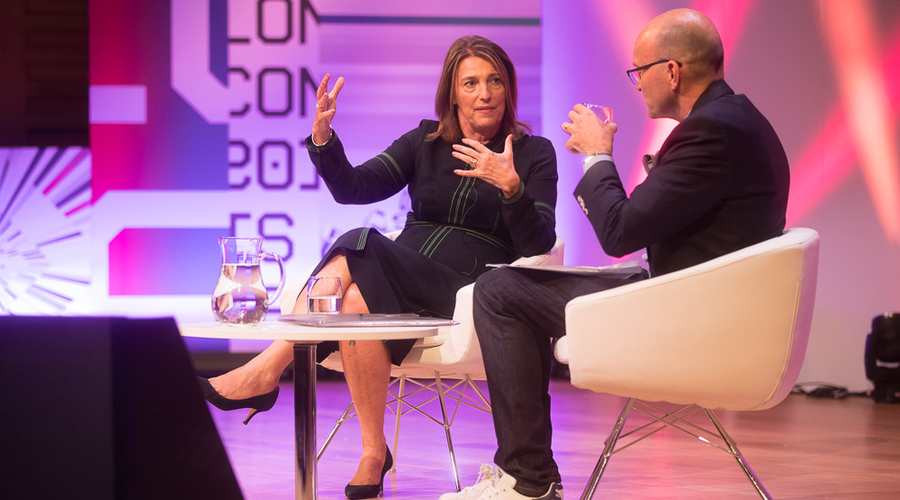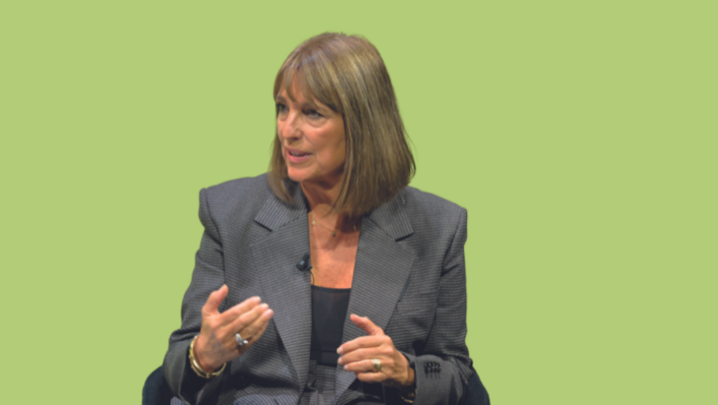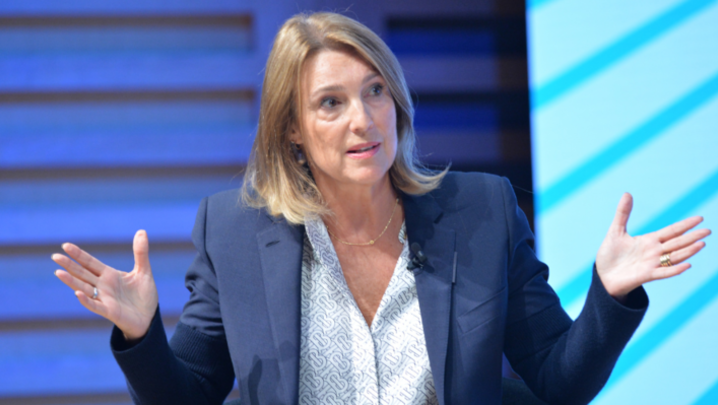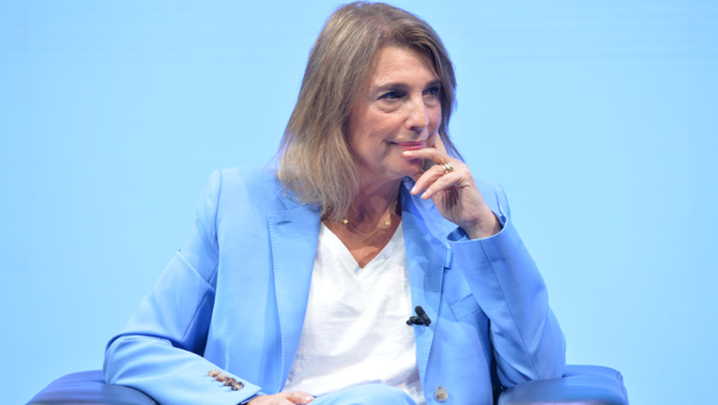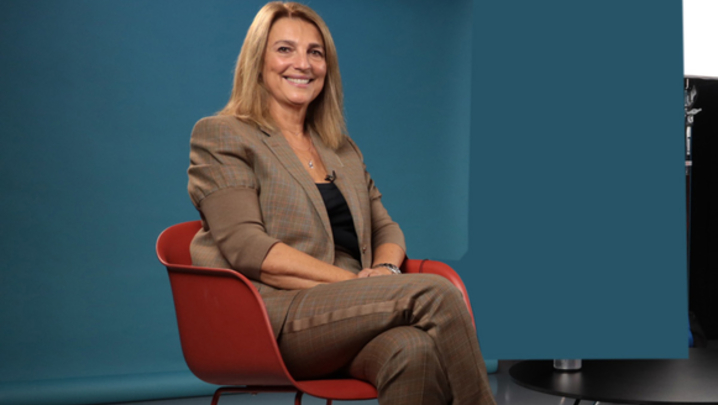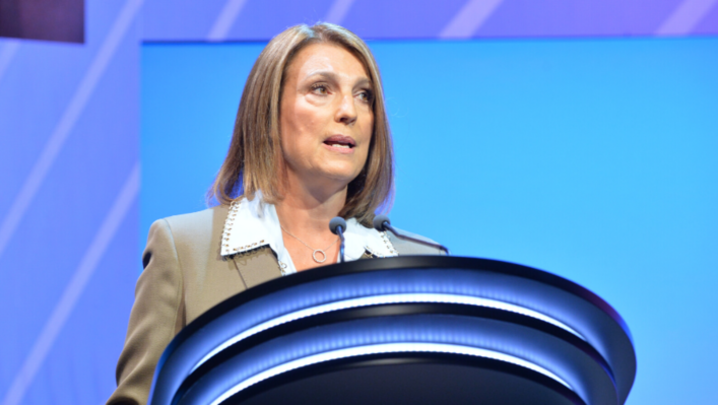Tara Conlan takes a ringside seat as Carolyn McCall sets out her vision for ITV
As a programme supplier to ITV, Expectation co-founder Tim Hincks felt he had to deny that he might pull some punches when interviewing ITV CEO Carolyn McCall. He announced to laughter that he would be asking her all the difficult questions, such as “where she went on holiday and what her favourite colour is.… I will absolutely go for it.”
McCall looked relieved at the distraction of Hincks’s humour as she was appearing at her first RTS London conference just two days after reports that the broadcaster might be bidding for Endemol Shine Group (ESG).
Hincks kicked off proceedings with an easy one: what does ITV mean to the former EasyJet and Guardian Media Group CEO? She listed its “amazing programmes” and said “it’s very friendly, it’s accessible… it’s not patronising. People, internally, say how creative ITV is. What I’ve found is that people weren’t really saying that externally. Bridging this… is interesting.”
ITV has long been on an acquisition drive and also been eyed as a target for takeover. McCall said the company’s strategy was “evolving”. “Everything is changing, so you have to have a strategy that evolves.
“At ITV, it’s all about the change in viewers, the change in advertisers and also this thing about being a contemporary, relevant and modern brand.”
People like ITV, said McCall, who took over from her predecessor, Adam Crozier, in January: “People have described it like a cup of tea on a cold winter’s night, very comforting. Those are good qualities.… We also want to be seen as innovative and give people things when they want it, where they want it.”
Interestingly, she added, “we know that people would watch us more if they thought differently about the brand”.
She noted that when the broadcaster puts up a range of its programmes – dramas such as Liar, Trauma or Unforgotten – viewers “ascribe them to BBC or Netflix, never to ITV, which is really interesting.
They don’t see the brand as doing really brilliant, high-quality drama consistently, which it does.”
Yet, BBC hit Bodyguard is an ITV Studios production, she pointed out.
Hincks asked how it felt to have supplied BBC One with a hit that was up against its own autumn drama jewel, Vanity Fair. “I think it’s a win for TV. What we say consistently is that the only place you can get these massive audiences is TV, and it’s actually the BBC and ITV.
“That’s very important for us because we’re a commercial PSB and we make a lot of advertising money on those audiences.
"We’ve obviously made quite a lot of money on Bodyguard because we produced it.
“But we still did a co-pro [with Netflix], so it is a win for us on both and that’s what the strategy is: to strengthen the broadcast division [and] to invest in content.... The budget is not going down. It’s £1bn and we hope it will stay at that level.”
Diversifying into other revenue streams beyond advertising by investing in intellectual property and companies in the US has paid off, and ITV is consolidating in those areas now.
When asked if ITV is in the race for ESG, unsurprisingly, McCall put her corporate hat on, saying: “That’s speculation; we never comment on speculation.”
Later, she said she had “no idea” who might buy ESG if ITV didn’t, and was “not going to comment” on whether, in line with the theme of the conference, ITV would be better off if part of a bigger outfit.
All she would add was that ITV is not growing for growth’s sake but to make a return to shareholders: “The most important thing for us is that we can organically grow Studios… whatever we looked at from now would have to be very financially disciplined.
“We have to be incredibly disciplined about any acquisition we make, whether that’s small or large.”
Should independents “who are not part of the ITV family” bring their ideas to you, asked Hincks, adding to laughter: “I’m asking for a friend.”
“I’m surprised you ask that, as the relationship between ITV and indies is a strong one,” said McCall.
“Even when we are talking to people who are looking to exit their own businesses and be bought, one of the biggest attractions of ITV is creative autonomy.
“The second thing is, they might get on to ITV1 and that gets them the most amazing showcase… then, they get global IP that can be monetised.”
She paid tribute to the ITV commissioning team and assured Hincks that “they will take the best ideas. I know we’re an integrated producer/broadcaster… but they want the best creative ideas. So just bring your ideas to them.”
“It’s annoying they have to be good, that’s all,” joked Hincks before moving on to the ITV boss’s thoughts on the Faangs. She gave the same response that many others had: they provided “opportunities and challenges”.
Companies had to be “more flexible” working for groups that they also competed with. But, like other broadcasters, she called for a “level playing field” in terms of regulation of the online giants.
PSBs were “critical to Britain”, declared McCall. She denied she was “whingeing”, and pointed out that ITV provided “a very safe environment – all those things are critical for our society and democracy. We are highly regulated… and you go on Google and they just self-regulate. It’s a big disparity.”
Having lauded the popularity of Love Island, she moved on to discuss the latest state of play in the drive to come up with a successor to the ill-fated Project Kangaroo. Hincks noted reports that ITV was in talks with the BBC about setting one up.
“We’re not going to be a British Netflix,”
McCall responded. “ITV is ITV and we need to play to our strengths. I’ve said publicly that we’ve done a huge amount of research and there’s no question that there’s a demand for British content that people have missed. And they’re willing to pay for it.
“So there’s ample evidence [that] this thing about multiple subscription services is coming through loudly. I think that’s good for us as it gives us an opportunity. We are strong on VoD. We are investing in the ITV Hub – it will become much more than catch-up.”
Despite Hincks pressing for more details, she would add only that “we are talking to partners there, but I can’t say what we’re up to or how we are doing it. The first people we should talk to about that would be our shareholders.”
It would not “start with a big bang.…Very few streaming services start with everything they’re going to do. Any streaming service will need some original content, but I think that comes maybe further down the line.”
ITV will “definitely be investing” in the ITV Hub to make it “somewhere between iPlayer and Hulu”, said McCall, adding: “it’s got decent technology” but “the functionality and the user experience are not as good as we’d like them to be”.
A key area for her is bringing ITV closer to its consumers. “ITV has this great fan club but it’s quite passive,” she suggested.
“They are really excited about us but we don’t really communicate with them [when] they want to know about drama, sports… events coming up, when a live final is, and so on.
“Those make people want to spend more time with you… and [maybe] spend more money with you.”
In Session Six, Carolyn McCall, CEO of ITV, was interviewed by Tim Hincks, Co-CEO, Expectation Entertainment. The producers were Sue Robertson and Martin Stott.

